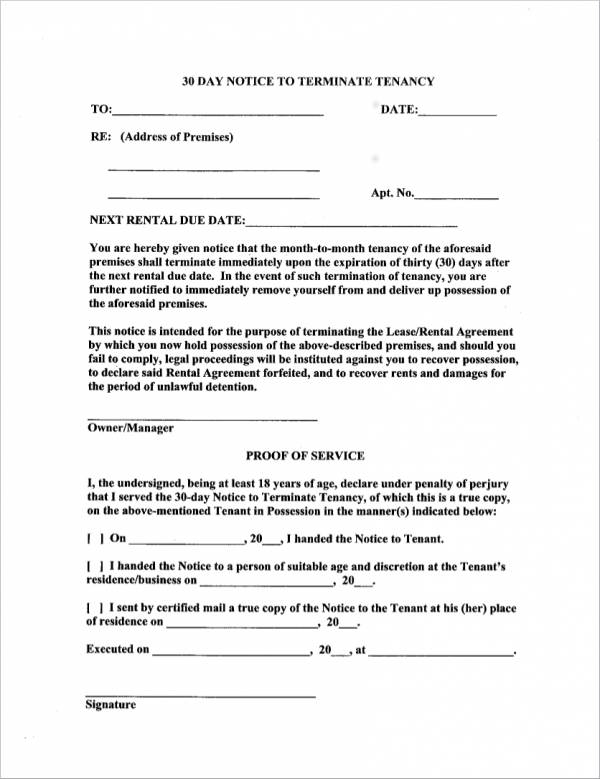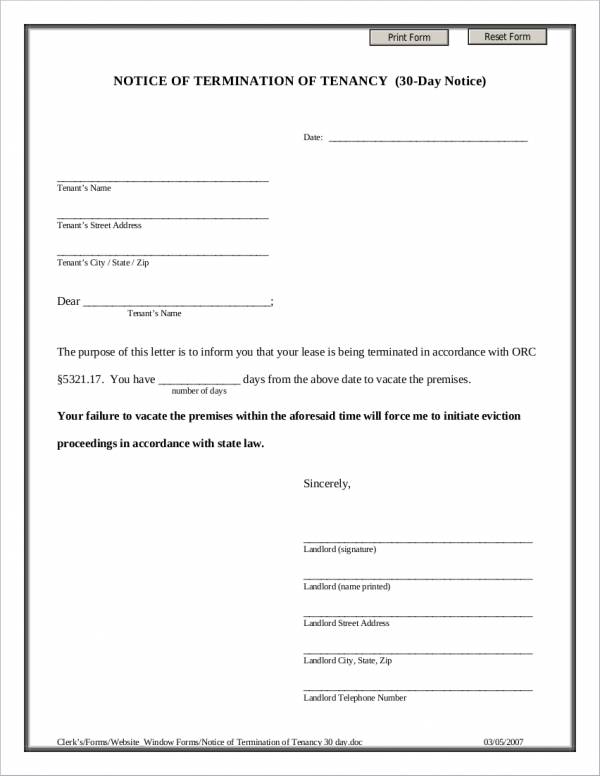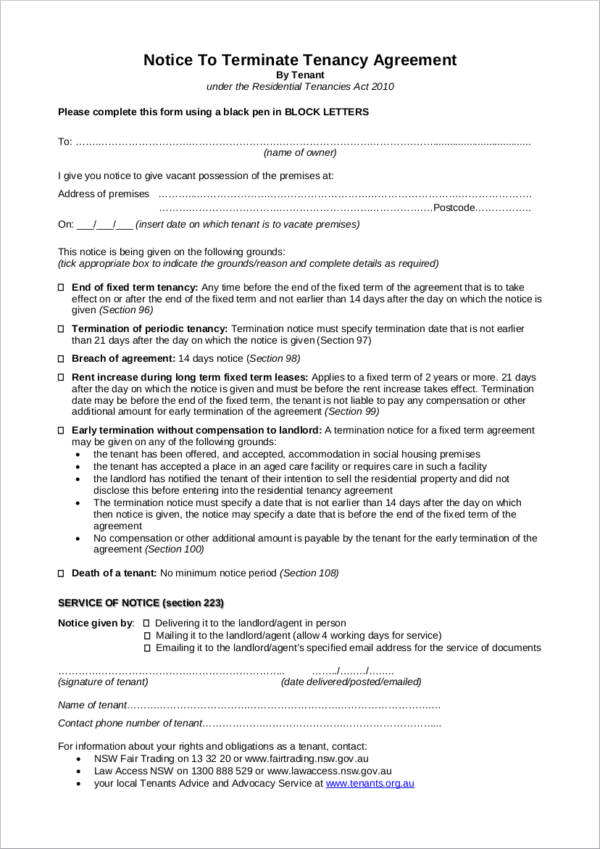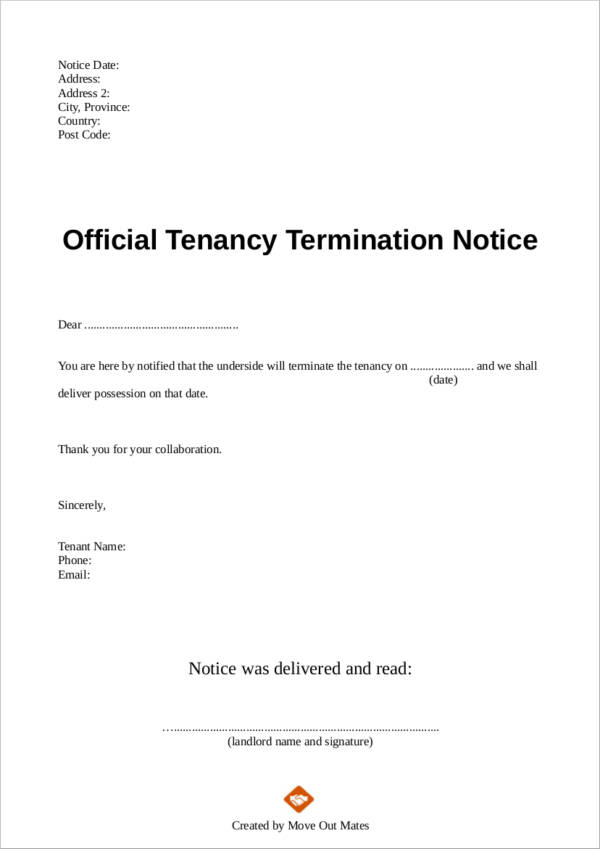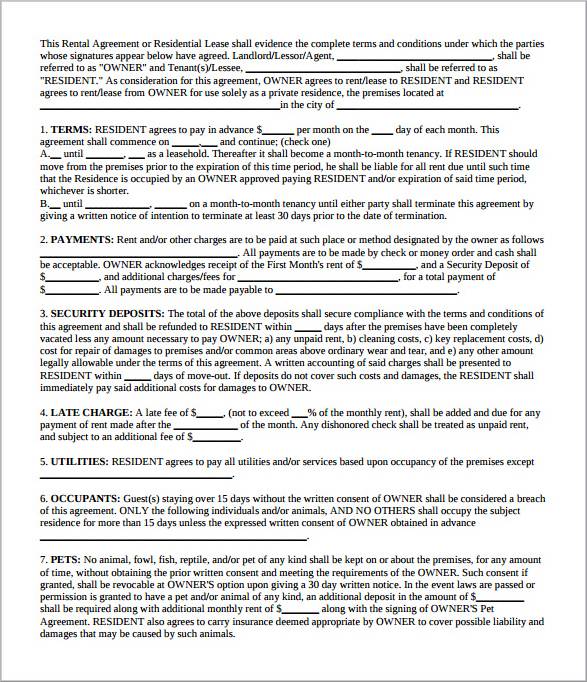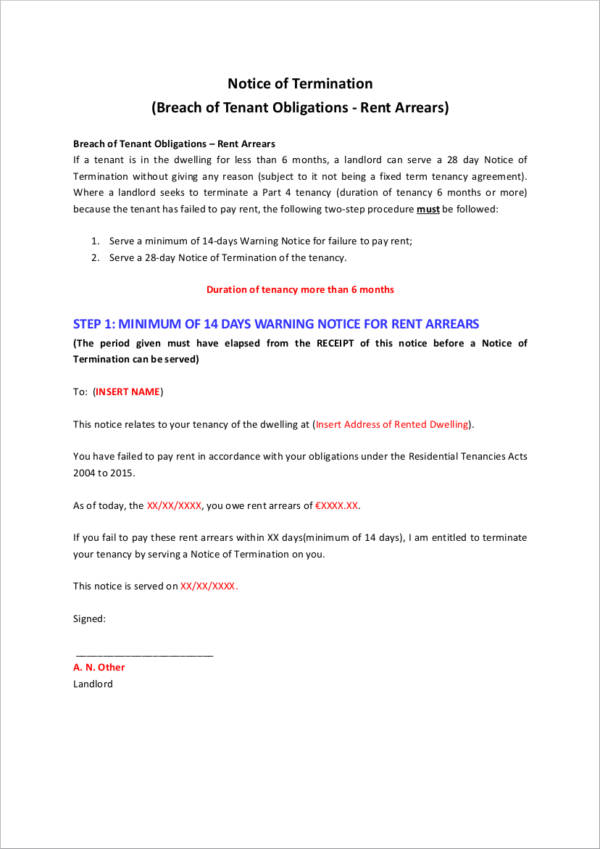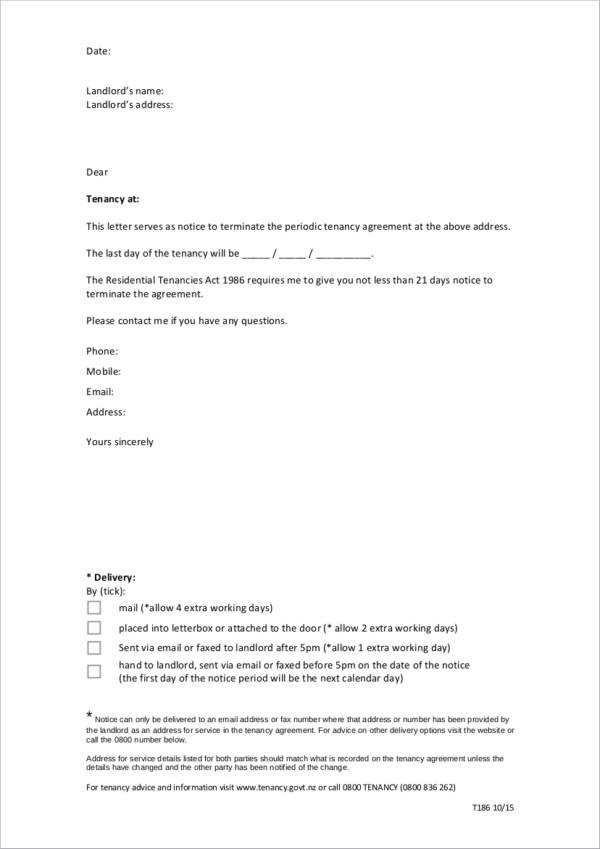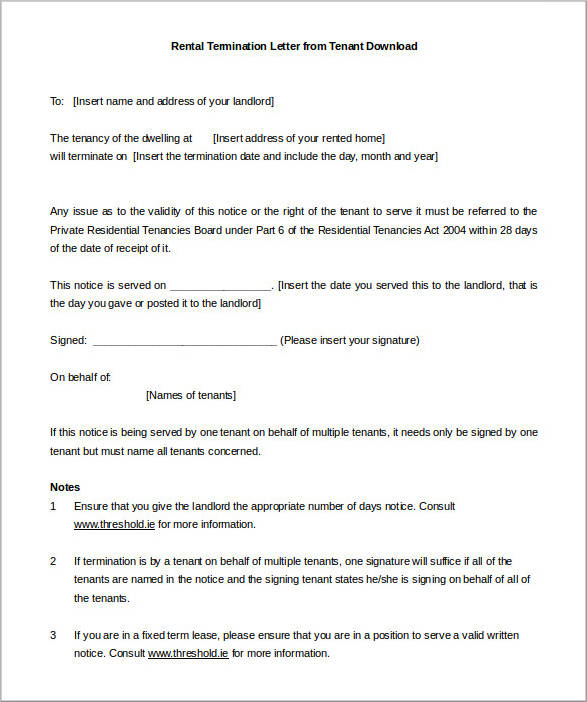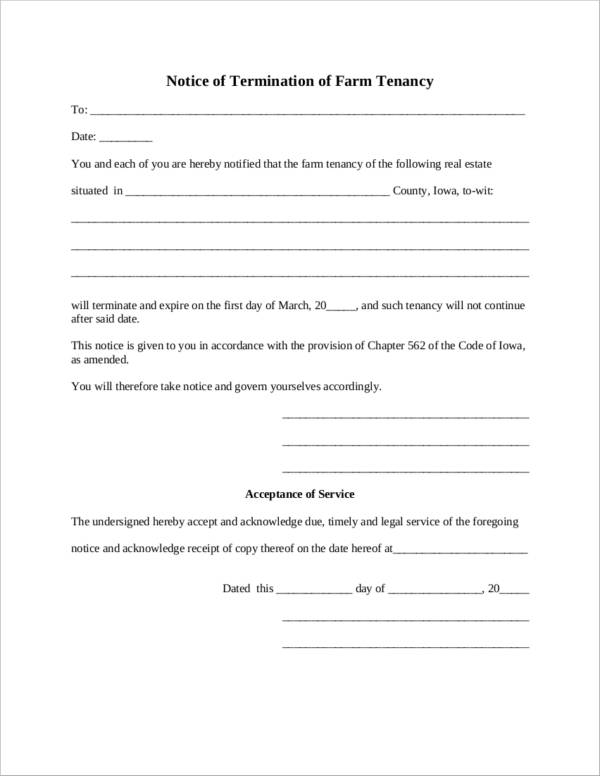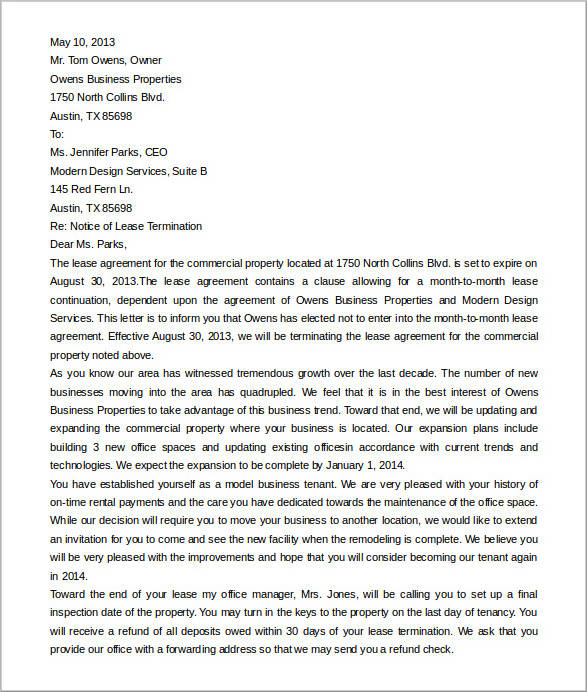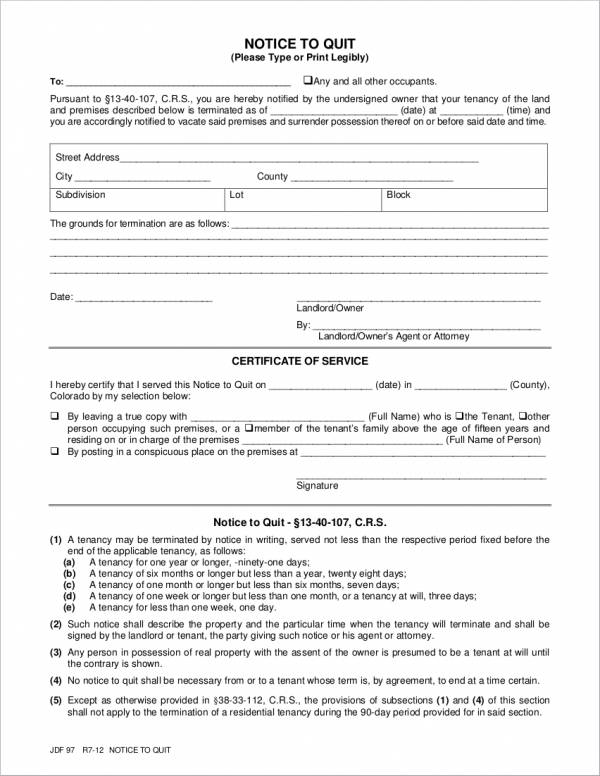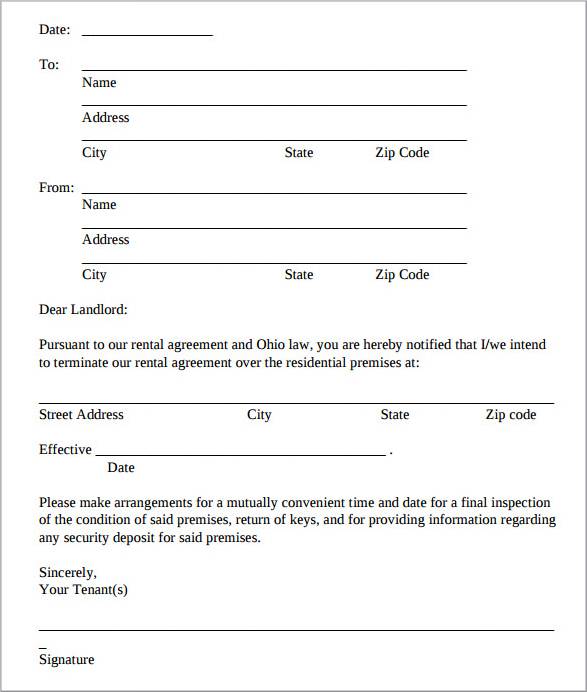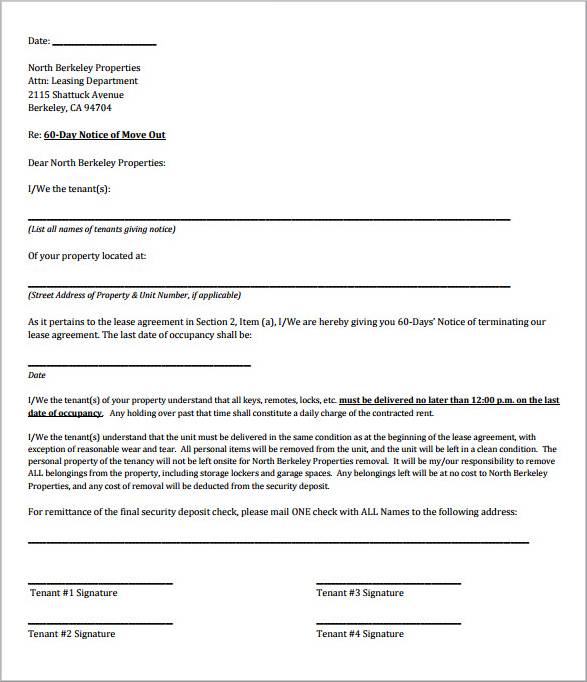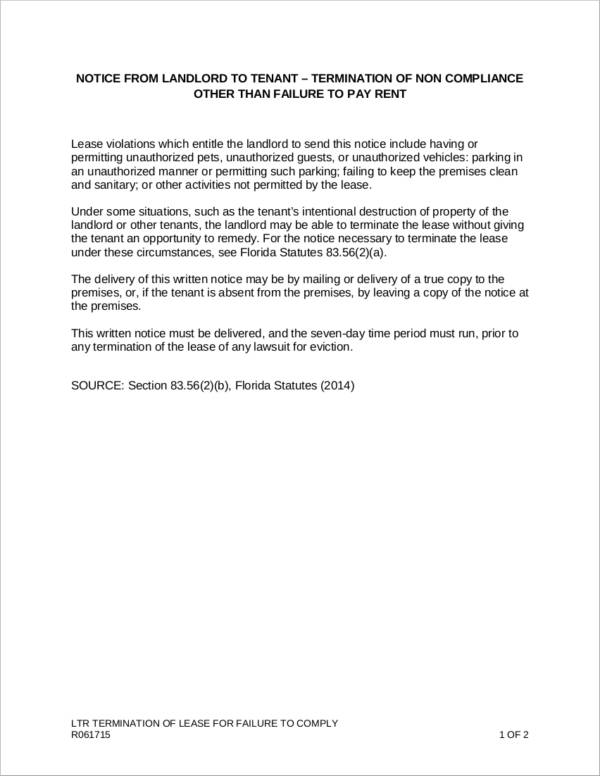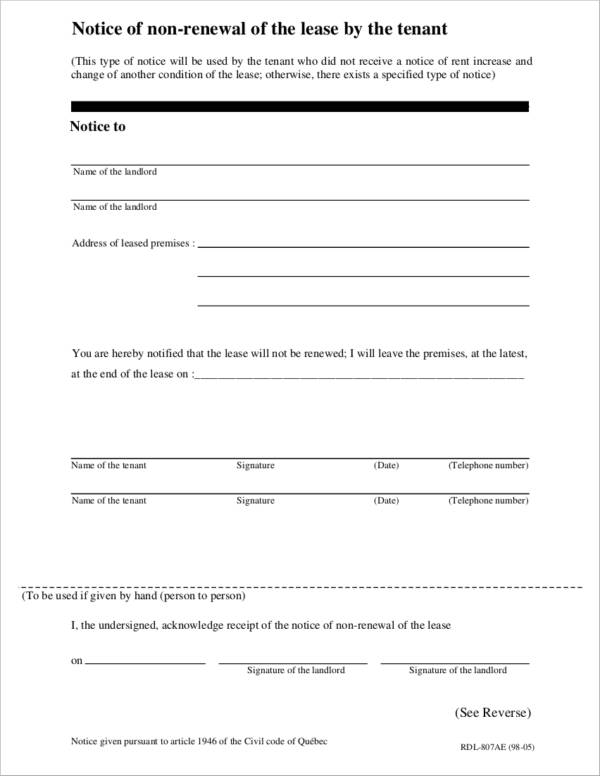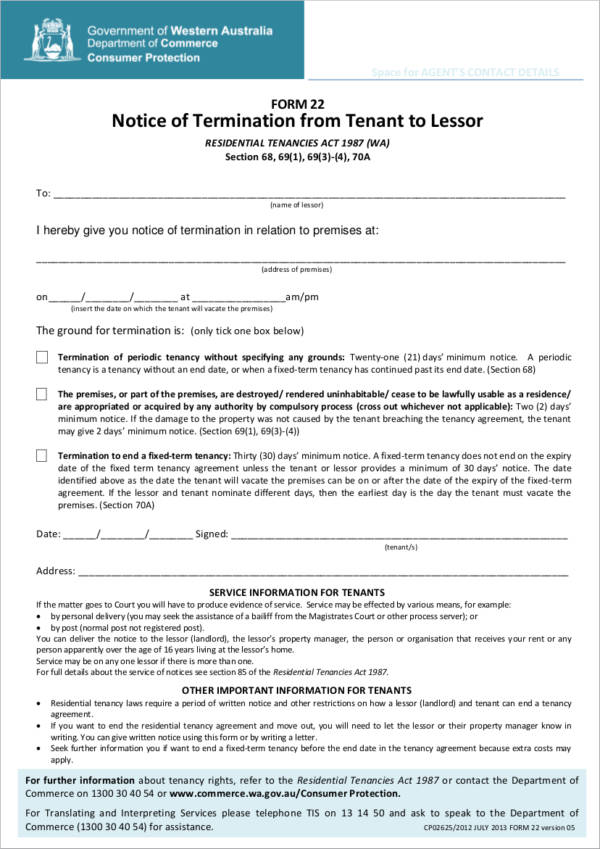What is a tenancy termination letter? When your rent or lease comes to an end, it is likely that you will receive a tenancy termination letter from your landlord. A tenancy termination letter tells you that your lease agreement or rental agreement with your landlord is about to end. It includes all other details that are important for the termination to be just and legal.
Tenancy termination letters need to be clearly written so that both landlord and tenant will come to an understanding about the very reason why the lease is going to be terminated. A clear and concise tenancy termination letter can only be made possible by having the basic knowledge about what it is, how it is written, and the many reasons why it is being used. We have also prepared tenancy termination sample letters in this article that will help you learn more about it.
Tenancy Termination Letter with 30 Days Notice
Printable Notice of Termination of Tenancy
Termination Letter to Terminate Tenancy Agreement
Tenant to Landlord Tenancy Termination Letter
Home Rental Termination Letter
Tenancy Termination Letter Due to Breach of Tenant Obligations
Tenant to Landlord Handwritten Tenancy Termination Letter
What Is the Difference between Tenancy Termination and Tenancy Eviction?
We often confuse tenancy termination with eviction and it has been that way for who knows how long. Truth is, there is actually a big difference between the two. It is also not that hard to differentiate one from the other, especially if you know some basic stuff about them or how they are both defined. You may also see termination of services letters
1. Tenancy Termination
- When a tenancy is terminated, it means that the landlord is not renewing your lease contract or rental contract. It could be due to various reasons like the landlord has already sold the property to someone or he has leased it to another person.
- In tenancy termination, the landlord notifies their tenant to vacate the leased property at the end of their contact. They may be given 20–30 days notice before the end of their simple contract to allow the tenant time to look for another place to move to and to pack up.
- The tenants are asked to move out of the property without the use of force or any court orders, and without following any court proceedings. You may also like sample termination of business letters
2. Tenancy Eviction
- When we say tenancy eviction, it means that the landlord wants the tenant to vacate the property even before the contract ends. This could be due to a breach of contract or failure of the tenant to follow house rules provided by the landlord. You may also check out examples of termination letters
- Tenancy eviction can also happen if a tenant refuses to leave the leased property after the notice to vacate given to them is due. A tenant is given a number of days, usually 20 days, to vacate the leased or rented property. If they refuse to do so, then that is the time that the landlord raises this to court, get a lawsuit, and have the tenant removed from the property.
- The removal of the tenant may be a peaceful one or may end up being a forceful removal. The tenant can voluntarily vacate the leased or rented property or get forcefully kicked out by the authorities. You may also see notice of termination letter samples & templates
What Are the Reasons Why a Tenancy Gets Terminated?
Not all tenants who are renting or leasing a property gets a termination notice from their landlord when their contracts are about to end. Some of them receive a renewal notice before their contract is up so that they may decide if they will renew their tenancy or not. When a landlord decides to end the tenancy, they decide to do so based on the following reasons:
1. A tenancy can get terminated when the lease agreement contract that they have with the landlord is about to end and the landlord does not renew the contract.
2. A tenancy can get terminated when there is a need for the landlord to have the property vacated in order to make repairs and improvements to the property.
3. A tenancy can get terminated when the landlord has sold the property and the buyer does not want to have tenants in the property. You may also like basic termination letter samples & templates
4. If the property was originally used for business and it will be used again for the same purpose, the then tenancy can be terminated because of that.
5. A tenancy can get terminated when you have agreed or have specifically requested not to renew your contract with the landlord when you had the contract signed. You may also check out early lease termination letters
6. The landlord can terminate your tenancy if you are a tenant at will who does not have any lease contract with them.
7. A tenancy can be terminated when the owner plans to move and live in the property or if one of the owner’s family will be living in the property. You may also like rental agreement letter samples
8. A tenancy can get terminated when the sole tenant or the tenant who was in contract with the landlord dies or leaves. This situation happens in families living in leased or rental properties.
Despite all of those reasons given above about why a tenancy can get terminated, it is still possible for a landlord to terminate a tenancy without providing any reasons. This is considered to be a legal action as long as the landlord provides a least or rent cancellation notice or a notice of termination letter a couple of days before the actual termination date.
Rental Termination Letter from Tenant
Termination Letter for Farm Tenancy
Rental Termination Letter from Landlord
Standard Tenancy Termination Letter by State
Residential Tenancy Termination Letter Template
Tenancy Termination and Moving Out Letter Template
Tenancy Termination Letter for Failure to Comply
Tenancy Termination Letter and Non-Renewal of Lease Template
Tenancy Termination Letter Format from Tenant to Lessor
What Is the Right Way to End a Tenancy?
It is indeed possible for any landlord to terminate any tenancy without a reason. It might sound too one-sided as this rule is clearly in favor of the landlord. Although this is so, your landlord can’t just randomly kick you out of their property. They still need to abide by the law and practice the right way to officially end your tenancy.
Below are the things that a landlord should do to properly end a tenancy:
1. To terminate a tenancy the right way, a landlord should first give their tenants some notice. The notice should be in writing and it can be in a form of a tenancy termination notice or a tenancy termination letter.
2. The tenant should be given enough time or enough notice before the actual tenancy termination date. It is not easy to find a new place to rent or lease. A good landlord will think about their tenants and give them enough time to move.
3. Also, the landlord should allow some time for the letter or notice to reach their tenant, especially if they are sending the notice or letter through the post. They need to consider how many days it will take for the letter or notice to reach the tenant and not count it as part of the notice period.
4. The written notice or the tenancy termination letter should include the address of the leased or rented property, the exact date of termination, and the landlord’s signature.
Of course, if this is a fixed-term tenancy, the landlord can’t just have the tenancy terminated anytime. A fixed-term tenancy can only be terminated on the agreed upon end date signed in the agreement or contract.
Benefits of a Tenancy Termination Letter
Listed below are some of the benefits of using a tenancy termination letter.
1. A tenancy termination letter notifies the tenant about the end of their tenancy in a formal way.
2. It provides an explanation to the tenant about why their tenancy is being terminated.
3. It includes important information about the tenancy termination, like the tenancy termination date, the name of the tenant and the landlord, the address of the property, and if there are any balances or amounts that they need to take care of. You may also see intent to vacate letters
4. It provides the tenant a written copy of the rent or lease termination notice, which is considered one of the first steps or ways to properly terminate a tenancy.
5. A tenancy termination letter is a useful reference or an effective proof in court when the situation requires one to file a case or lawsuit. You may also like lease renewal letter templates
How to Write a Tenancy Termination Letter
When it comes to writing letters, many of us automatically fail on our first attempt. It’s either we don’t know how to write the letter or we do not know what the letter is for. Another reason is that even if we have enough knowledge of what the letter is all about, we fail to review samples and steps on how to make them. It’s not too late to do that now. To help you, we have enumerated the steps on how you can write a tenancy letter easily.
1. Determine if you need to write a formal letter.
Should a tenancy termination letter be written using the formal letter format? The letter is a formal way of telling or notifying a tenant that their tenancy will be terminated, thus it should be written in a formal letter format. The letter can also be used as proof in court to tell that the tenancy was terminated the right way. If you are not used to writing formal letters or need to know more about it, we have sample formal letters that you might be interested in.
2. Prepare the necessary details for your letter.
It is important that the letter you will be creating is complete in order to produce one that is reliable and trustworthy. The details you should include in the letter are
- the date when the letter will be sent to the tenant;
- the name, address, and contact details of both the landlord and the tenant;
- the salutation;
- the exact date when the actual termination is;
- the address where the property is located;
- the number of days notice provided to the tenant;
- the reason or explanation why the tenancy is terminated; and
- the signature of the landlord over his printed name.
3. Compose your letter.
Now that you have all those details ready, you can now start writing the body of the letter. The body of the letter is where you can find the entire message or the purpose of the letter. It mostly consists of three paragraphs. The first paragraph tells of the termination of the tenancy and its effective date. The second paragraph talks about the reason why the tenancy is being terminated, and the third paragraph is usually where the landlord offers help about the transition. You may also check out printable termination letter samples & templates
4. Write all the contents together.
Arrange the details that you have gathered using the formal letter format that you prefer. Your tenancy termination letter should now start to look like a really legit letter.
5. Review and finalize your letter.
Once you have it written in your preferred format, you will need to review everything that you have written so far. Make sure to proofread your work and check for any grammar and spelling errors. You can also have another person proofread it for you. An error-free work will make it look even more professional and neat. Take a look at the sample professional letters that we have available as reference.
6. Have it sent.
Decide whether you will be sending this via email or through the post. There are certain things that you need to consider in order to decide the best way to send the letter. If your tenant can easily be reached through email, then the best method to send your letter is via email, otherwise, you would have to send it through the post office. When sending a letter using the post office, consider the time it will take for your letter to get to your tenant. This should not be included in the number of days notice that you provide them. Check out our professional letter and email writing guidelines to help you make your letter good.
Related Posts
Resignation Letter for Medical Samples & Templates
Letter of Intent Samples & Templates
Letter of Intent for a Job Samples & Templates
Lease Proposal Letter Samples & Templates
Letter of Inquiry Samples & Templates
Character Reference Letter Samples & Templates
Claims Letter Samples & Templates
Response Letter Sample & Templates
Follow Up Letter Samples & Templates
Sample Project Proposal Letter Templates
Donation Letter Samples & Templates
Addressing a Formal Letter Samples & Templates
Grievance Letter Samples & Templates
Sample Sponsor Thank You Letter Templates
Sample Letters of Request

